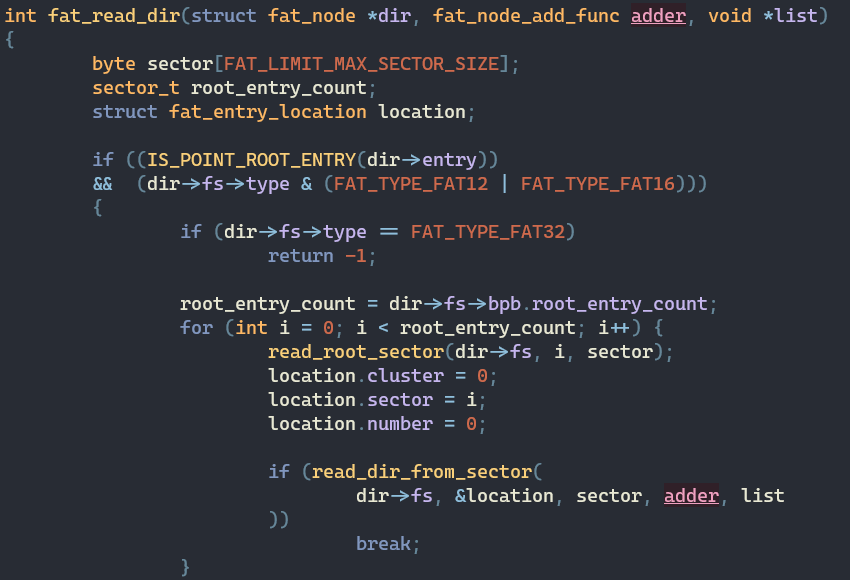shell_filesystem 코드는 shell 과 FAT 사이를 이어주는 징검다리이다. shell 측에선 추상화된 filesystem 의 코드를 호출하고 filesystem 은 실질적인 구현인 FAT 의 코드를 호출하게 된다.
이러한 방식이 상당히 복잡하고 또 불필요하다고 느낄 수 있겠지만 이러한 과정을 거치게 되면 하나의 파일 시스템에서 다른 파일 시스템으로 변경(예를 들어 FAT 에서 ext 로의 변경) 하더라도 shell 코드는 그 어떠한 변경 없이 그대로 가져다 쓸 수 있다는 큰 장점이 있다. 이것이 바로 추상화의 아름다움이라 할 수 있겠다.
1. shell_filesystem.h
#ifndef SHELL_FILESYSTEM_H__
#define SHELL_FILESYSTEM_H__
#include "disksim.h"
#include "shell_entry.h"
struct shell_fs_operations;
struct shell_file_operations {
int (*create)(
struct disk_operations *, struct shell_fs_operations *,
const struct shell_entry *, const char *,
struct shell_entry *
);
int (*remove)(
struct disk_operations *, struct shell_fs_operations *,
const struct shell_entry *, const char *
);
int (*read)(
struct disk_operations *, struct shell_fs_operations *,
const struct shell_entry *, const struct shell_entry *,
unsigned long, unsigned long, char *
);
int (*write)(
struct disk_operations *, struct shell_fs_operations *,
const struct shell_entry *, struct shell_entry *,
unsigned long, unsigned long, const char *
);
};
struct shell_fs_operations {
int (*read_dir) (
struct disk_operations *, struct shell_fs_operations *,
const struct shell_entry *, struct shell_entry_list *
);
int (*stat) (
struct disk_operations *, struct shell_fs_operations *,
unsigned int *, unsigned int *
);
int (*mkdir) (
struct disk_operations *, struct shell_fs_operations *,
struct shell_entry *, const char *, struct shell_entry *
);
int (*rmdir) (
struct disk_operations *, struct shell_fs_operations *,
const struct shell_entry *, const char *
);
int (*lookup)(
struct disk_operations *, struct shell_fs_operations *,
const struct shell_entry *, struct shell_entry *,
const char *
);
struct shell_file_operations file_ops;
void *pdata;
};
struct shell_filesystem {
char *name;
int (*mount) (
struct disk_operations *, struct shell_fs_operations *,
struct shell_entry *
);
void (*umount) (struct disk_operations *, struct shell_fs_operations *);
int (*format) (struct disk_operations *, void *);
};
void shell_filesystem_register(struct shell_filesystem *);
#endif 앞서 shell.c 코드를 설명할 때 shell_create() 에서 fops 는 초기화되지 않았는데 이는 mount() 가 호출됨에 따라 다시 초기화가 이뤄지게 된다.
2. shell_filesystem.c
// -----------------------------------------------------------------------------
// source file macro
// -----------------------------------------------------------------------------
#define _POSIX_C_SOURCE 200809L
// -----------------------------------------------------------------------------
// include own header
// -----------------------------------------------------------------------------
#include "shell_filesystem.h"
// -----------------------------------------------------------------------------
// include user-defined header
// -----------------------------------------------------------------------------
#include "fat.h"
// -----------------------------------------------------------------------------
// include c standard library
// -----------------------------------------------------------------------------
#include <stdio.h>
#include <string.h>
#include <stdlib.h>
// -----------------------------------------------------------------------------
// local function
// -----------------------------------------------------------------------------
static char *stpncpy_ex(char *dest, char *orig, char *stop, int size)
{
while ( ( *orig != EOF )
&& ( (strchr(stop, *orig)) == NULL )
&& ( (size--) > 0 ) )
*dest++ = *orig++;
return dest;
}
static int fat_entry_to_shell_entry(
const struct fat_node *fat_entry,
struct shell_entry *shell_entry
) {
struct fat_node *entry = (struct fat_node *) shell_entry->pdata;
char *str;
memset(shell_entry, 0x00, sizeof(struct shell_entry));
if (entry->entry.attribute != FAT_ATTR_VOLUME_ID) {
str = shell_entry->name;
str = stpncpy_ex(str, (char *) fat_entry->entry.name, " ", 8);
if (fat_entry->entry.name[8] != 0x20) {
str = stpncpy_ex(str, ".", " ", 1);
str = stpncpy_ex(
str, (char *) &fat_entry->entry.name[8], " ", 3
);
}
}
if (fat_entry->entry.attribute & FAT_ATTR_DIRECTORY
|| fat_entry->entry.attribute & FAT_ATTR_VOLUME_ID)
{
shell_entry->is_dir = 1;
} else {
shell_entry->size = fat_entry->entry.filesize;
}
*entry = *fat_entry;
return 0;
}
static int fs_create(
struct disk_operations *disk, struct shell_fs_operations *fops,
const struct shell_entry *parent, const char *name,
struct shell_entry *ret
) {
struct fat_node *fat_parent, fat_entry;
int result;
fat_parent = (struct fat_node *) parent->pdata;
result = fat_create(fat_parent, name, &fat_entry);
*((struct fat_node *) ret->pdata) = fat_entry;
return result;
}
static int fs_remove(
struct disk_operations *disk, struct shell_fs_operations *fops,
const struct shell_entry *parent, const char *name
) {
struct fat_node file;
if (fat_lookup((struct fat_node *) parent->pdata, name, &file) != 0)
return -1;
return fat_remove(&file);
}
static int fs_read(
struct disk_operations *disk, struct shell_fs_operations *fops,
const struct shell_entry *parent,
const struct shell_entry *entry,
unsigned long offset ,unsigned long length, char *buffer
) {
return fat_read((struct fat_node *) entry->pdata, offset, length, buffer);
}
static int fs_write(
struct disk_operations *disk, struct shell_fs_operations *fops,
const struct shell_entry *parent, struct shell_entry *entry,
unsigned long offset, unsigned long length, const char *buffer
) {
return fat_write((struct fat_node *) entry->pdata, offset, length, buffer);
}
static int fs_stat(
struct disk_operations *disk, struct shell_fs_operations *fops,
unsigned int *total_sectors, unsigned int *used_sectors
) {
return fat_df(
(struct fat_filesystem *) (fops->pdata),
total_sectors,
used_sectors
);
}
static int adder(void *list, struct fat_node *entry)
{
struct shell_entry_list *entry_list = (struct shell_entry_list *) list;
struct shell_entry new_entry;
fat_entry_to_shell_entry(entry, &new_entry);
shell_entry_list_add(entry_list, &new_entry);
return 0;
}
static int fs_read_dir(
struct disk_operations *disk, struct shell_fs_operations *fops,
const struct shell_entry *parent, struct shell_entry_list *list
) {
struct fat_node entry;
if (list->count)
shell_entry_list_release(list);
entry = *((struct fat_node *) parent->pdata);
fat_read_dir(&entry, adder, list);
return 0;
}
static bool is_exist(
struct disk_operations *disk, struct shell_fs_operations *fops,
const struct shell_entry *parent, const char *name)
{
struct shell_entry_list list;
bool find = false;
shell_entry_list_init(&list);
fs_read_dir(disk, fops, parent, &list);
LIST_ITERATOR_WITH_ENTRY(list.head, entry, struct shell_entry, list)
if (strncmp(entry->name, name, 12) == 0) {
find = true;
LIST_ITERATOR_BREAK;
}
LIST_ITERATOR_END
shell_entry_list_release(&list);
return find;
}
static int fs_mkdir(
struct disk_operations *disk, struct shell_fs_operations *fops,
struct shell_entry *parent, const char *name,
struct shell_entry *ret
) {
struct fat_node fat_parent;
struct fat_node fat_entry;
int result;
if (is_exist(disk, fops, parent, name))
return -1;
fat_parent = *((struct fat_node *) parent->pdata);
result = fat_mkdir(&fat_parent, name, &fat_entry);
fat_entry_to_shell_entry(&fat_entry, ret);
return result;
}
static int fs_rmdir(
struct disk_operations *disk, struct shell_fs_operations *fops,
const struct shell_entry *parent, const char *name
) {
struct fat_node fat_parent;
struct fat_node dir;
fat_parent = *((struct fat_node *) parent->pdata);
fat_lookup(&fat_parent, name, &dir);
return fat_rmdir(&dir);
}
static int fs_lookup(
struct disk_operations *disk, struct shell_fs_operations *fops,
const struct shell_entry *parent, struct shell_entry *entry,
const char *name
) {
struct fat_node fat_parent, fat_entry;
int result;
fat_parent = *((struct fat_node *) parent->pdata);
result = fat_lookup(&fat_parent, name, &fat_entry);
fat_entry_to_shell_entry(&fat_entry, entry);
return result;
}
/*******************************************************************************
* export function
******************************************************************************/
int fs_mount(
struct disk_operations *disk, struct shell_fs_operations *fops,
struct shell_entry *root)
{
struct fat_filesystem *fat;
struct fat_node fat_entry;
int result;
char vol_label[12] = { 0, };
*fops = (struct shell_fs_operations) {
.read_dir = fs_read_dir,
.stat = fs_stat,
.mkdir = fs_mkdir,
.rmdir = fs_rmdir,
.lookup = fs_lookup,
.file_ops = (struct shell_file_operations) {
.create = fs_create,
.read = fs_read,
.write = fs_write,
.remove = fs_remove
},
.pdata = NULL
};
fops->pdata = malloc(sizeof(struct fat_filesystem));
if (fops->pdata == NULL)
return -1;
fat = (struct fat_filesystem *) fops->pdata;
memset(fat, 0x00, sizeof(struct fat_filesystem));
fat->disk = disk;
result = fat_read_superblock(fat, &fat_entry);
if (result == 0) {
if (fat->type == FAT_TYPE_FAT16)
memcpy(vol_label, fat->bpb.bpb32.bs.volume_label, 11);
else
memcpy(vol_label, fat->bpb.bs.volume_label, 11);
printf("%-12s: %s\n", "FAT type",
fat_type_to_string(fat->type));
printf("%-12s: %s\n", "volume label", vol_label);
printf("%-12s: %d\n", "bytes per sector",
fat->bpb.bytes_per_sector);
printf("%-12s: %d\n", "sectors per cluster",
fat->bpb.sectors_per_cluster);
printf("%-12s: %d\n", "number of FATs",
fat->bpb.number_of_fats);
printf("%-12s: %d\n", "root entry count",
fat->bpb.root_entry_count);
printf("%-12s: %d\n", "total sectors",
(fat->bpb.total_sectors ? fat->bpb.total_sectors
: fat->bpb.total_sectors32));
putchar('\n');
}
fat_entry_to_shell_entry(&fat_entry, root);
return result;
}
void fs_umount(struct disk_operations *disk, struct shell_fs_operations *fops)
{
if (fops && fops->pdata) {
fat_umount((struct fat_filesystem *) fops->pdata);
free(fops->pdata);
fops->pdata = 0;
}
}
int fs_format(struct disk_operations *disk, void *param)
{
char *fat_type_string[3] = {
"FAT12", "FAT16", "FAT32"
};
enum fat_type fat_type[3] = {
FAT_TYPE_FAT12, FAT_TYPE_FAT16, FAT_TYPE_FAT32
};
int type_idx;
char *param_str = (char *) param;
if (param) {
int i;
for (i = 0; i < 3; i++) {
if (strncmp(param_str, fat_type_string[i], 100) == 0) {
type_idx = i;
break;
}
}
if (i == 3) {
printf("unkown FAT type\n");
return -1;
}
} else {
if (disk->number_of_sectors <= 8400)
type_idx = 0;
else if (disk->number_of_sectors <= 66600)
type_idx = 1;
else
type_idx = 2;
}
printf("formatting as a %s\n", fat_type_string[type_idx]);
return fat_format(disk, fat_type[type_idx]);
}
/*******************************************************************************
* export function
******************************************************************************/
void shell_register_filesystem(struct shell_filesystem *fs)
{
*fs = (struct shell_filesystem) {
.name = "FAT",
.mount = fs_mount,
.umount = fs_umount,
.format = fs_format
};
} 파일 시스템 코드 역시 결국 FAT 측의 함수로 advance 되기에 더 설명할 부분이 없다. 눈 여겨볼만한 부분은 fat_node 구조체와 shell_entry 구조체를 섞어 쓰고 있는 부분이다. 이러한 구조를 채택한 이유는 filesystem 의 동작을 shell_entry 로 고정하면 파일 시스템이 변경 되더라도 각각의 filesystem 의 데이터를 추출해 shell_entry 만 잘 채워넣으면 되기 때문이다. 그래서 fat_entry_to_shell_entry() 라는 메서드가 존재하는 것이다.

ls 명령어의 동작 또한 shell_entry_list 구조체를 통해 동작하게 된다. fat_node 로 이어진 연결 리스트가 아니다. 디렉터리 내의 파일들을 탐색하는 측은 FAT 이기에 연결 리스트를 구성하기 위한 adder 함수를 fat 측으로 포워딩한다.
